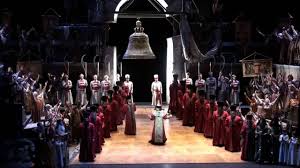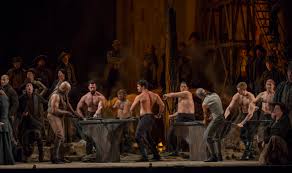Yes, I know that our forthcoming concert is called “Great Opera Choruses”. By one of the many strange quirks of the English language, Chorus can mean either the song to be sung, or the people singing it. This post is about the Opera Chorus – the people doing the singing.
Why should I write about the people in the Chorus? Because I have just realised what they do, and how much we should appreciate their consummate skill.
The first thing which prompted these thoughts was when Jim Abram, taking last night’s rehearsal, asked why we could not look at the conductor while we were singing just one long single note, so that he could show where it should finish. There we all are, heads in our books – it must be very dispiriting for the conductor. And if we are just singing a single note, surely we do not need the support of the notation in the book to remind us what we are doing!
The second prompt came as I stepped out of the shower this morning to hear ABC Classic FM playing the introduction to the Anvil Chorus. Right, I thought, here’s my chance. There is no time to find the score, so I will sing along from memory, perhaps even with some imaginary sashees across the imaginary stage. Well…………..I got the notes right – mostly. I got the louds and softs right, even remembering to do a gradual crescendo through each of the long phrases. I got nearly all the entries on time. But the words – oh dear! I was completely at sea. And then of course I did not have to worry about any stage directions, prancing around the bathroom clad only in a towel – I could make them up for myself.
That made me realise just what it takes to be in the Opera Chorus. Not only do you have to have a great voice, and be able to move graciously around the stage, but you have to remember so much. Notes, expression, words, your own movements, other peoples’ movements, when to watch the conductor, and no doubt many other things besides, all potentially dressed in some fearfully uncomfortable costume.
So let’s hear it for the members of the Opera Chorus. And let’s think of them when we rehearse and perform our own concert. Let’s even have a go at emulating them, and committing at least some of the words and music to memory. It’s worth it, just to be able to follow Carlos at key points, and so to make music of which we can be justifiably proud.

